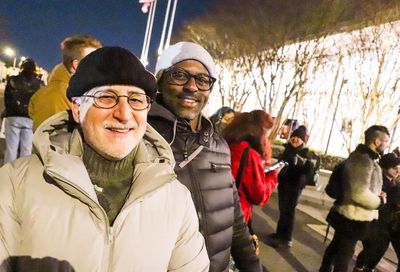California High Court Takes Prop 8 Standing Question

The California Supreme Court granted the request to take the certified question, as requested by the U.S. Court of Appeals for the Ninth Circuit, in the Perry v. Schwarzenegger challenge to Proposition 8 — putting off same-sex marriages in California for at least an additional eight months.
What does this mean?
Under the U.S. Constitution, there must be an actual “case or controversy” presented to a federal court in order for it to hear a case. This often plays out in federal courts in a debate over standing. In the Perry challenge to Proposition 8, none of the parties who enforce Proposition 8 — state officials, including the governor and attorney general — chose to appeal the Aug. 4, 2010, trial court ruling that struck down Proposition 8 as unconstitutional. The proponents of Proposition 8 have attempted to appeal the ruling to the Ninth Circuit, but the Ninth Circuit cannot hear the appeal if no party with standing to appeal the ruling does so.
The question, then, is whether the proponents have standing.
California’s high court will be deciding the request of the Ninth Circuit to answer:
Whether under Article II, Section 8 of the California Constitution, or otherwise under California law, the official proponents of an initiative measure possess either a particularized interest in the initiative’s validity or the authority to assert the State’s interest in the initiative’s validity, which would enable them to defend the constitutionality of the initiative upon its adoption or appeal a judgment invalidating the initiative, when the public officials charged with that duty refuse to do so.
If the California Supreme Court finds the proponents to have a “particularized interest” or “the authority to assert the State’s interest,” the Ninth Circuit could then find the proponents to have standing. At that point, the appeal of the Perry trial court decision could go forward.
The briefing schedule before the California high court is set as follows:
The opening brief on the merits is to be served and filed on or before Monday, March 14, 2011. The answer brief on the merits is to be served and filed on or before Monday, April 4. A reply brief may be served and filed on or before Monday, April 18.
The California court said it aims to hold oral arguments on the issue “as early as September, 2011.”
As such, the Ninth Circuit will not be getting the case back, at least, until October — but likely later. Additionally, because the Ninth Circuit granted a stay of the trial court’s order in Perry pending the outcome of the Ninth Circuit appeal, there will be no same-sex marriages during this time.
The full order can be found below the jump.
***
S189476
IN THE SUPREME COURT OF CALIFORNIA
En Banc
__________________________________________________________________
KRISTIN M. PERRY et al., Plaintiffs and Respondents,
CITY AND COUNTY OF SAN FRANCISCO, Plaintiff, Intervenor and Respondent;
v.
ARNOLD SCHWARZENEGGER, as Governor, etc. et al., Defendants;
DENNIS HOLLINGSWORTH, Defendants, Intervenors and Appellants.
__________________________________________________________________
The request, pursuant to California Rules of Court, rule 8.548, that this court decide a question of California law presented in a matter pending in the United States Court of Appeals for the Ninth Circuit, is granted.
For the purposes of briefing and oral argument, defendant-intervenors Dennis Hollingsworth, Gail J. Knight, Martin F. Gutierrez, Mark A. Jansson, and ProtectMarriage.com (collectively “Proponents”) are deemed the petitioners in this court. (Cal. Rules of Court, rule 8.520(a)(6).)
In order to facilitate expedited consideration and resolution of the issues presented, and to accommodate oral argument in this matter as early as September, 2011, the normal briefing schedule is shortened, pursuant to California Rules of Court, rule 8.68, as follows:
The opening brief on the merits is to be served and filed on or before Monday, March 14, 2011. The answer brief on the merits is to be served and filed on or before Monday, April 4. A reply brief may be served and filed on or before Monday, April 18.
Any person or entity wishing to file an amicus curiae brief must file an application for permission to file such brief, accompanied by the proposed brief, on or before Monday, May 2, 2011. Any party may serve and file an omnibus reply to any or all amicus curiae briefs on or before Monday, May 9, 2011.
The court does not contemplate any extension of the above deadlines.
Support Metro Weekly’s Journalism
These are challenging times for news organizations. And yet it’s crucial we stay active and provide vital resources and information to both our local readers and the world. So won’t you please take a moment and consider supporting Metro Weekly with a membership? For as little as $5 a month, you can help ensure Metro Weekly magazine and MetroWeekly.com remain free, viable resources as we provide the best, most diverse, culturally-resonant LGBTQ coverage in both the D.C. region and around the world. Memberships come with exclusive perks and discounts, your own personal digital delivery of each week’s magazine (and an archive), access to our Member's Lounge when it launches this fall, and exclusive members-only items like Metro Weekly Membership Mugs and Tote Bags! Check out all our membership levels here and please join us today!



















